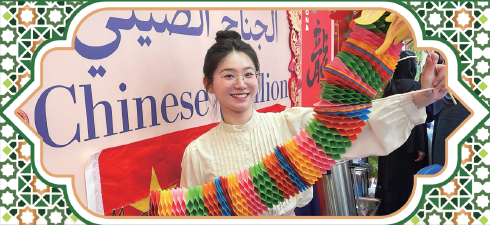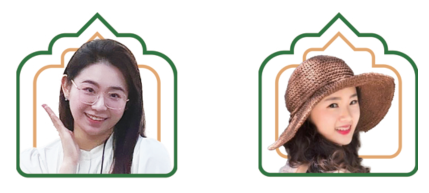Cultural exchange flourishes in Riyadh


Zhang Xi displaying a Chinese dragon at a cultural event at Prince Sultan University in Riyadh, Saudi Arabia, on Jan 29. CHINA DAILY
Confucius Institute in Riyadh fosters cultural exchange through Chinese language education, bridging diverse backgrounds and promoting mutual understanding in Saudi Arabia, Li Xinran reports.
A Confucius Institute, jointly established by Prince Sultan University and Shenzhen University, was inaugurated in Riyadh, the capital of Saudi Arabia, in June 2023. It's the country's first Confucius Institute, and it has now kicked off its second semester.
According to Zhang Xi, 23, one of the two Chinese teachers at the institute, they had approximately 30 students during the previous semester, all of whom were beginners.
"About 90 percent of them have returned for this semester, which makes me very proud and content," she said.
Zhang graduated with a bachelor's degree from Shenzhen University in South China's Guangdong province last June, majoring in international Chinese language education, and had already enrolled in a master's program. However, she stumbled upon the institute's search for potential teachers, and she just had to participate.
"It's a once-in-a-lifetime opportunity to learn how to teach beyond classroom settings," Zhang said.
Xiao Xinxin, 32, is the other teacher at the institute, having obtained her master's degree in international Chinese language education at Shenzhen University.
Initially, Xiao didn't aspire to become a Chinese teacher. She pursued a double major in French and management at college. However, during an exchange program at the University of Padova in Italy, Xiao developed strong bonds with the students and faculty at the local Confucius Institute. "That experience influenced my decision to change career paths and pursue a master's in international Chinese language education," she said.
While Zhang primarily teaches students enrolled at Prince Sultan University, Xiao's students come from different countries such as Lebanon, Sudan, France, and Turkiye, with diverse backgrounds including students from other universities, locals whose jobs require basic Chinese proficiency, as well as faculty and staff at the university.
"I believe their diverse life experiences contribute positively to our classroom dynamic. It's more constructive than just me lecturing while students taking notes," said Xiao. "It allows them to think critically, face challenges, and help each other out, which is extremely beneficial for the students."
Arabic is the official language of Saudi Arabia, but Zhang noticed that most of the students are fluent in both Arabic and English, which she believes greatly aids their learning of Chinese.
"Their proficiency in English allows them to write from left to right, which is opposite to Arabic, and they are already familiar with the concept of "be" verbs, which are present in both Chinese and English but not in Arabic," Zhang said.
While some students do find Chinese difficult to learn and occasionally display a lack of confidence, Xiao said that the course offers a precious opportunity for most of them.
For example, one of Xiao's students is from Lebanon and was coincidentally recruited. He ran into Xiao on the streets and inquired about Chinese classes. He expressed deep affection for China and Chinese culture and mentioned that he had been taking online courses but the schedule didn't work out very well. "Now, he is one of the most enthusiastic participants in class and always arrives first," Xiao said.
Apart from learning the Chinese language and culture, Xiao observed a significant transformation among the students in the classes. Initially, the local students requested segregated classes by gender, but this wasn't feasible due to practical reasons. "At first, none of the local students communicated with the opposite gender. But as the semester progressed, they began collaborating on group projects and even chatting with each other during breaks," Xiao said. "This is an additional value that our Chinese classes provide."
For Zhang and Xiao, the experience of living and teaching in Saudi Arabia also changed them.
"At first, I was very worried since I knew little about this country. I wondered if I had to wear a hijab and if I might inadvertently offend them," said Xiao. "But upon arrival, I found that the locals were very hospitable and polite. It is a country filled with people from all around the world."
Zhang also gained a deeper understanding of Saudi Arabia. "Safety was my biggest concern, but then I found that the laws are very strict here," she said. "Also, while it's inaccurate to say all Saudi people are millionaires, it is true that their welfare is well taken care of, and most of them seem quite laid-back."
In recent years, Saudi Arabia has been striving to transform and open itself up, promoting infrastructure construction, and increasing interactions with other countries, including China.
"The Saudi government has been encouraging and promoting Chinese education, with the hope that the Chinese language will be included in the curriculum at various schools and different stages of education," said Xiao. "A group of local teachers will soon arrive at the institute for special training courses. In the long run, training local teachers is more constructive than recruiting teachers from China."
Xiao hopes that increased cultural exchange could reduce the psychological distance between the people of the two countries.
"The unfamiliarity is mutual, and we have much to learn about each other. As more and more Saudi people are beginning to learn the Chinese language and culture, I hope more and more Chinese people could also visit Saudi Arabia to see this lovely country for themselves."
Contact the writer at lixinran@i21st.cn




































